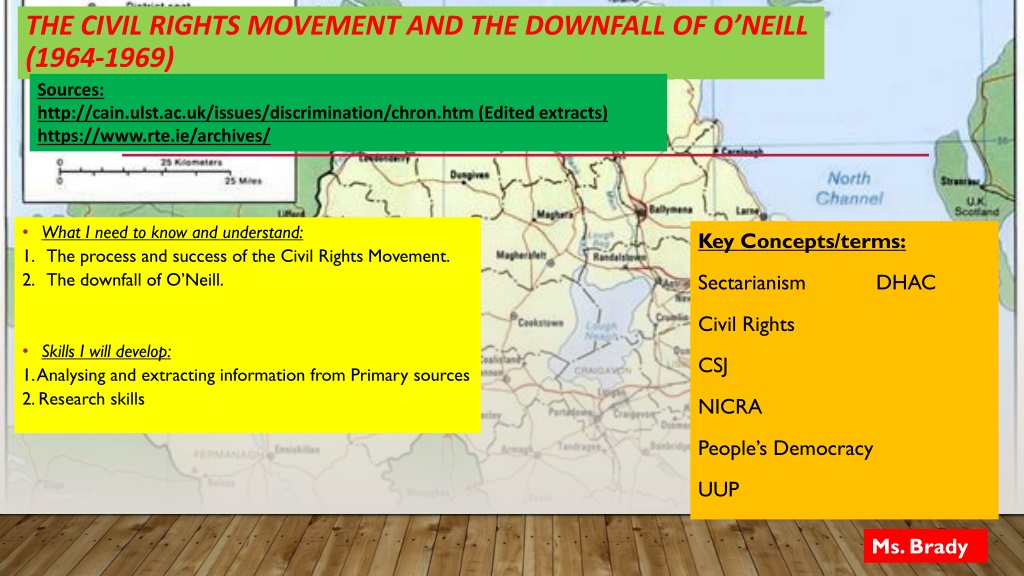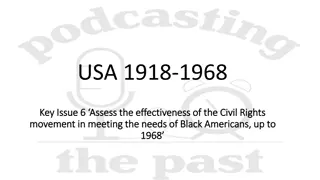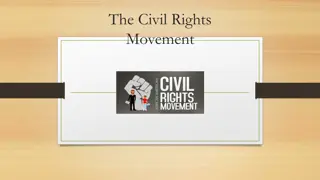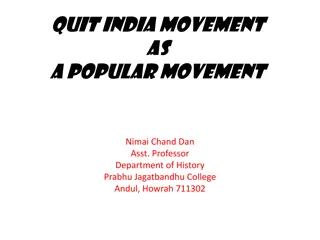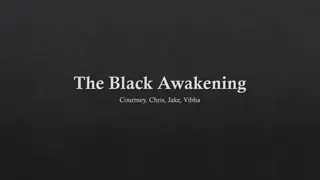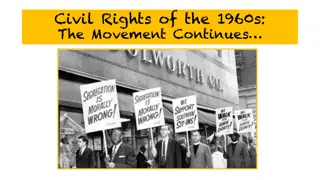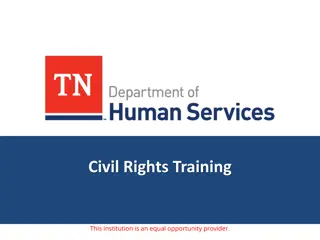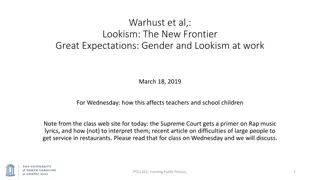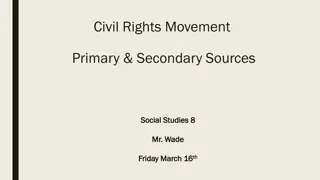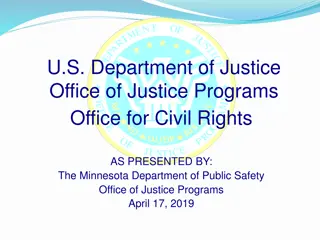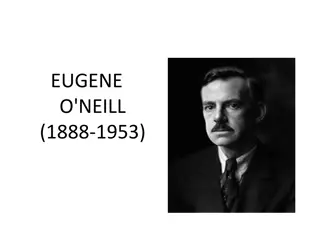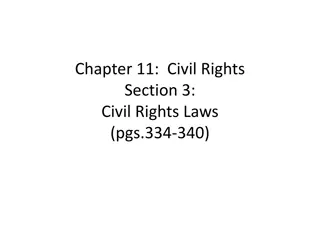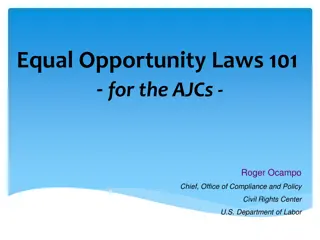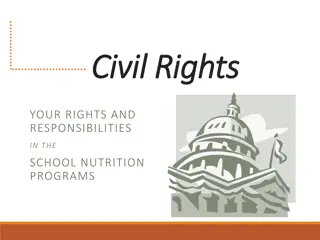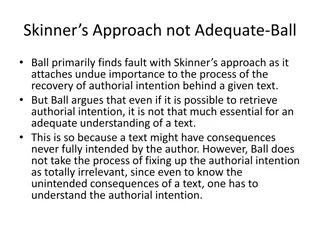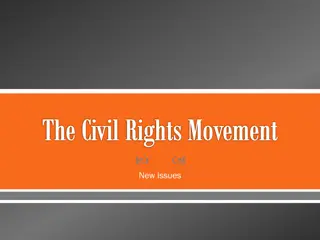The Civil Rights Movement and Terence O'Neill's Demise (1964-1969)
The Civil Rights Movement in Northern Ireland, spearheaded by organizations like the Campaign for Social Justice (CSJ) and the Northern Ireland Civil Rights Association (NICRA), aimed to address widespread discrimination against Catholics. The movement advocated for electoral reform, an end to housing discrimination, and the disbandment of the paramilitary-style police force known as the 'B-Specials.' Key events such as the Caledon Protest led by Austin Currie and the first Civil Rights March marked significant milestones in the movement's history.
Download Presentation

Please find below an Image/Link to download the presentation.
The content on the website is provided AS IS for your information and personal use only. It may not be sold, licensed, or shared on other websites without obtaining consent from the author. Download presentation by click this link. If you encounter any issues during the download, it is possible that the publisher has removed the file from their server.
E N D
Presentation Transcript
THE CIVIL RIGHTS MOVEMENT AND THE DOWNFALL OF ONEILL (1964-1969) Sources: http://cain.ulst.ac.uk/issues/discrimination/chron.htm (Edited extracts) https://www.rte.ie/archives/ What I need to know and understand: 1. The process and success of the Civil Rights Movement. 2. The downfall of O Neill. Key Concepts/terms: Sectarianism DHAC Civil Rights Skills I will develop: 1. Analysing and extracting information from Primary sources 2. Research skills CSJ NICRA People s Democracy UUP Ms. Brady
Chronological Display of events: 1964 CAMPAIGN FOR SOCIAL JUSTICE (CSJ) FORMED The CSJ was the forerunner of the civil rights movement and it began a programme of publicising what it saw as widespread discrimination, in a number of areas of life, against Catholics in Northern Ireland. Research Q. What couple set up the CSJ? 1 February 1967 The Northern Ireland Civil Rights Association (NICRA) was formed. The Civil Rights Movement called for a number of reforms one of which was for 'one man, one vote', that is, a universal franchise for local government elections. At the time only rate-payers were entitled to votes, and there were other anomalies to do with additional votes for companies. The association also pressed for the end to gerrymandering of electoral boundaries. Other reforms pressed for included: the end to perceived discrimination in the allocation of public sector housing and appointments to, particularly, public sector employment; the repeal of the Special Powers Act; and the disbandment of the 'B-Specials' (Ulster Special Constabulary) which was a paramilitary style reserve police force which was entirely Protestant in its makeup. Summarise in bullet point form the aims of NICRA. November 1967 The Derry Housing Action Committee (DHAC) was formed.
THURSDAY 20 JUNE 1968- THE CALEDON PROTEST, CO. TYRONE Austin Currie, then Nationalist Member of Parliament (MP) at Stormont, and a number of others, began a protest about discrimination in the allocation of housing by 'squating' (illegally occupying) in a house in Caledon, County Tyrone. The house had been allocated by Dungannon Rural District Council to a 19 year-old unmarried Protestant woman, Emily Beatty, who was the secretary of a local Unionist politician. Emily Beatty was given the house ahead of older married Catholic families with children. The protesters were evicted by members of the Royal Ulster Constabulary (RUC) among whose members was Emily Beatty's brother. Watch the following footage and answer the Research Q. https://www.rte.ie/archives/exhibitions/1031-civil-rights- movement-1968-9/1032-caledon-protest/319335-caledon- civil-rights-campaign/ (1:46-4:00) What was the impact of the events at Caledon, Co. Tyrone? Who was leader of the Nationalist Party at this time? Homework: Extra Reading Secondary source Newspaper article https://www.irishtimes.com/news/politics/the-lost-story-of-northern- ireland-s-first-civil-rights-march-1.3605463
SATURDAY 24 AUGUST 1968 FIRST CIVIL RIGHTS MARCH Lesson 2 The Campaign for Social Justice (CSJ), the Northern Ireland Civil Rights Association (NICRA), and a number of other groups, held the first 'civil rights march' in Northern Ireland from Coalisland to Dungannon. Loyalists organised a counter demonstration in an effort to get the march banned (a tactic that was to be used throughout the period of 'the Troubles') and in fact the planned rally was banned. Despite this the march passed off without incident. The publicity surrounding the march acted as encouragement to other protesting groups to form branches of the NICRA. Key Figures that contributed to NICRA: Conn/Patricia McCluskey Eddie McAteer (Nationalist MP) Austin Currie (Nationalist MP) Gerry Fitt (Labour MP) Saturday 31 August 1968 A delegation from the Northern Ireland Civil Rights Association (NICRA) met with members of the Derry Housing Action Committee (DHAC) to discuss a proposed civil rights march. An Ad-hoc Civil Rights Committee was established to organise the march on Saturday 5 October 1968.
SATURDAY 5 OCTOBER 1968 - CIVIL RIGHTS MARCH IN DERRY [CONSIDERED BY MANY AS THE START DATE OF THE CURRENT 'TROUBLES'] Organised by members of the Derry Housing Action Committee (DHAC) and supported by the Northern Ireland Civil Rights Association (NICRA), was stopped by the Royal Ulster Constabulary (RUC) before it had properly begun. The marchers had proposed to walk from Duke Street in the Waterside area of Derry to the Diamond in the centre of the City. Present at the march were three British Labour Party Members of Parliament (MP), Gerry Fitt, then Republican Labour MP, several Stormont MPs, and members of the media including a television crew from RTE. When the march was announced, the Apprentice Boys, a Protestant organisation, declared that they would hold a parade on the same day. On 3 October 1968, the Stormont government banned all parades. The following day, all of the organisations behind the civil rights protest met and decided to go ahead with their parade. The RUC broke-up the march by baton-charging the crowd and leaving many people injured including a number of MPs. The incidents were filmed and there was world-wide television coverage. The incidents in Derry had a profound effect on many people around the world but particularly on the Catholic population of Northern Ireland. Immediately after the march there were two days of serious rioting in Derry between the Catholic residents of the city and the RUC. Watch the following primary footage and answer the Research Q. https://www.rte.ie/archives/2013/1004/478333-civil-rights- march-in-derry/ What Civil liberties are they demanding and what do they not wish for?
DEVELOPMENTS Friday 8 November 1968 Londonderry Corporation agreed to a Nationalist request to introduce a points system in the allocation of public sector housing. Terence O Neill was under pressure by the British government to resolve the issues in N.I. Friday 22 November 1968; O'Neill announced a package of reform measures which had resulted from meetings in London with Harold Wilson, then British Prime Minister, and James Callaghan, then British Home Secretary. The five point reform plan included: a nine member 'Development Commission' to take over the powers of the Londonderry Corporation; Ian Paisley Critical Thinking: How do you suspect extreme Unionists viewed & reacted to these reforms? an ombudsman to investigate complaints against government departments; the allocation of houses by local authorities to be based on need; the Special Powers Act to be abolished as it was safe to do so; and some reform of the local government franchise (the end of the company votes). Unionists opposed to O Neill Ian Paisley Brian Faulkner James Chichester- Clarke
DEVELOPMENTS Watch the following primary footage and answer the Research Q. https://www.youtube.com/watch?v=SOxhEK168EQ&t=68s According to the source: 4th January 1969 How did the Protestant community view the march through loyalist areas? Student Civil Rights Group; People s Democracy planned a march from Derry to Belfast. The marchers were ambushed and attacked at Burntollet Bridge on Jan. 4th by a loyalist mob with sticks, stones and crowbars. The RUC did nothing to protect the marchers. What were the marchers trying to demonstrate about the Northern Irish state? What did the police do on the night the marchers arrived back to Derry? H.W. Narrative Engagement Read ahead about the downfall of O Neill in your textbook. Wednesday 15 January 1969 O'Neill announced the setting up of an official inquiry into the disturbances in Derry and elsewhere. The inquiry, under the chairmanship of Lord Cameron, a Scottish judge, was to look into the causes of the civil unrest. Brian Faulkner of O Neill s party the UUP resigns in protest. Bernadette Devlin
ONeills Downfall Lesson 3 Watch the following primary footage and answer the Research Q. https://www.rte.ie/archives/exhibitions/1042-northern-ireland- 1969/1043-stormont-election/320068-unionists-call-for-oneill- resignation/ According to the source, why does the UUP want O Neill to resign? https://www.rte.ie/archives/exhibitions/1042-northern- ireland-1969/1043-stormont-election/320078- brookeborough-critical-of-oneill/ 24th February 1969 Stormont General election Why is Brookeborough critical of O Neill receiving Taoisigh LeMass & Lynch of the Republic? O Neill almost looses to Ian Paisley of the Protestant Unionist Party in the Bannside Constituency. 39 seats go to Unionists but not all were pro O Neill; weakening his position. https://www.rte.ie/archives/exhibitions/1042-northern- ireland-1969/1045-one-man-one-vote/320245-on-one- man-one-vote-passed/ What was the result on One Man One Vote reform? How does Brian Faulkner feel about One Man One Vote? Wednesday 23 April 1969 The Unionist Party voted by 28 to 22 to introduce universal adult suffrage in local government elections in Northern Ireland. The demand for 'one man, one vote' had been one of the most powerful slogans of the civil rights movement. James Chichester-Clarke, then Minister of Agriculture, resigned in protest at the reform.
ONEILLS DOWNFALL March/April 1969 The UVF carried out a series of explosions on electricity stations and reservoirs across N.I. to have O Neill removed from office and end the reform programme. 28 April 1969 O Neill resigns from office of Prime Minister. James Chichester-Clarke succeeds him. V https://www.rte.ie/archives/exhibitions/1042-northern- ireland-1969/1046-new-prime-minister/320270-hume-on- oneill-resignation/ According to the source; why was O Neill overthrown? From your study of the O Neill era write a detailed account on his downfall. Consider the following: The actions taking by O Neill that disappointed Unionists. The actions taking by O Neill that disappointed Nationalists. What pressure was O Neill under? Did he fail as a political leader? John Hume
VIOLENCE ESCALATES 12th of August Battle of the Bogside An Apprentice Boys of Derry march took place and marchers were protected by the RUC. When they tried to enter the Bogside (Catholic area) rioting ensued for 2 days. Jack Lynch Irish Taoiseach intervenes his speech further infuriates Unionists. Complete the following worksheet task: https://www.scoilnet.ie/uploads/resources/26883/26619.pdf 14th August - British soldiers arrive in Derry Catholics viewed this as a victory over the RUC & the troops as their saviours Loyalist/Protestants became fearful & resentful. Rioting begins in Belfast Mobs were supported by B-Specials. Catholic homes burned out 1505 families flee their homes. The Troubles had truly begun! Now let s address exam questions from 1949-1969
